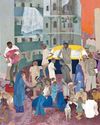
HE WAS ONE OF the greatest scientists the world has ever known, yet if I had to convey the essence of Albert Einstein in a single word, I would choose ‘simplicity’. Perhaps an anecdote will help. Once, caught in a downpour, he took off his hat and held it under his coat. Asked why, he explained, with admirable logic, that the rain would damage the hat, but his hair would be none the worse for its wetting. This knack for going instinctively to the heart of a matter was the secret of his major scientific discoveries—this and his extraordinary feeling for beauty.
I first met Albert Einstein in 1935, at the famous Institute for Advanced Study in Princeton, New Jersey. Einstein had been among the first to be invited to the Institute and was offered carte blanche as to salary. To the director’s dismay, Einstein asked for an impossible sum: It was far too small. The director had to plead with him to accept a larger salary.
I was in awe of Einstein and hesitated before approaching him about some ideas I had been working on. My hesitation proved unwarranted. When I finally knocked on his door, a gentle voice said, “Come”—with a rising inflection that made the single word both a welcome and a question. I entered his office and found him seated at a table, calculating and smoking his pipe. Dressed in illfitting clothes, his hair characteristically awry, he smiled a warm welcome. His utter naturalness at once set me at ease.
As I began to explain my ideas, he asked me to write the equations on the blackboard so that he could see how they developed. Then came the staggering—and altogether endearing—request: “Please go slowly. I do not understand things quickly.” This from Einstein! He said it gently, and I laughed. From then on, all vestiges of fear were gone.
BURST OF GENIUS
Diese Geschichte stammt aus der March 2020-Ausgabe von Reader's Digest India.
Starten Sie Ihre 7-tägige kostenlose Testversion von Magzter GOLD, um auf Tausende kuratierte Premium-Storys sowie über 8.000 Zeitschriften und Zeitungen zuzugreifen.
Bereits Abonnent ? Anmelden
Diese Geschichte stammt aus der March 2020-Ausgabe von Reader's Digest India.
Starten Sie Ihre 7-tägige kostenlose Testversion von Magzter GOLD, um auf Tausende kuratierte Premium-Storys sowie über 8.000 Zeitschriften und Zeitungen zuzugreifen.
Bereits Abonnent? Anmelden

BOOKS
Books review

STUDIO - Off Lamington Road by Gieve Patel
Oil on Canvas, 54 x 88 in

NEWS FROM THE WORLD OF MEDICINE
FOODS THAT FIGHT DEMENTIA

TO HELL AND BACK
The Darvaza crater in Turkmenistan is known as the Gates of Hell. I stood on its edge - and lived to tell the tale

THE SNAKE CHARMERS
Invasive Burmese pythons are squeezing the life out of Florida's vast Everglades. An unlikely sisterhood is taking them on

Sisterhood to Last a Lifetime
These college pals teach a master class in how to maintain a friendship for 50-plus years

...TO DIE ON A HOCKEY RINK
ONE MINUTE I WAS PLAYING IN MY BEER LEAGUE, THE NEXT I WAS IN THE HOSPITAL

Just Sit Tight
Broken, battered and trapped in a ravine for days, I desperate driver wonders, \"Will anyone find me?\"

Allow Me to Mansplain...
If there's one thing we know, it's this: We're a nation of know-it-alls

THE BITTER TRUTH ABOUT SUGAR (AND SUGAR SUBSTITUTES!)
It's no secret that we have a serious addiction. Here's how to cut back on the sweet stuff, once and for all.